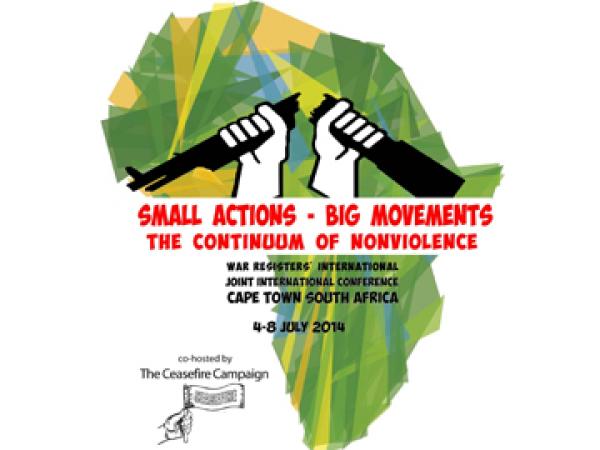War resisters across Africa headed for Cape Town

From 4 to 8 July, Cape Town will host the first ever War Resisters International Conference to be held in Africa. The Pan-African conference will bring together representatives of grassroots movements from over 25 African countries.
“From the conflict resolvers in Congo, Rwanda, Burundi and the Great Lakes region to peace educators in Ghana, Sierra Leone, Niger and elsewhere in West Africa; from conscientious objectors in Eritrea and the Horn of Africa to women’s rights activists and environmentalists from East Africa; from the still-unrecognized colonized people of Western Sahara to the struggling local peoples of Swaziland, people are coming from every corner of the continent which many conference participants see as not just a land of violence, but as a land of great hope, nonviolence, and possibility,” said Matt Meyer, War Resisters International Africa support network coordinator.
Meyer, who as a 19-year-old conscientious objector from New York, attended his first WRI conference in 1982 in Perugia, Italy, noticed there was no representation from Africa or Latin America. Since then, he has hoped to see this initiative on African soil.
“There’s always a better way than war. There’s always a nonviolent way. There’s nothing more destructive than war,” says Terry Crawford-Browne, activist and member of WRI.
Crawford-Browne, who grew up in Libya and moved to South Africa for the first time in the late 1960s as a student, believes there will always be conflict, but what is important is that the conflict can always be resolved by nonviolent means.
Rugshanda Pascoe, a Manenberg community activist said, “This conference is important for the people of Manenberg because war is a constant in our lives in Manenberg.”
Residents are on a daily basis confronted by gang violence. “The gangs fight with each other without considering the public. Innocent people are the ones who are most hurt and affected.”
“Since I can remember, I grew up in violence,” says Pascoe, who has been living in Manenberg since she was five-years-old and is turning 40 this year. She added that the government was not doing anything besides containing the problem.
Gang violence is not unique to Manenberg, it occurs all over the Cape Flats. In one week in June, two matric pupils were shot before entering their school in Mitchells Plein and on the Saturday night, a 16-year-old was shot dead outside his house in Mitchells Plein. Both incidents are believed to be linked to gang violence.
Pascoe hopes that the WRI conference will be “more than just a conference”, that it will lead to a safe space being created where the residents of Manenberg and community leaders can engage with the gang leaders to find a nonviolent solution.
“The constant eruption of violence has become the norm,” said Pascoe, adding “Enough is Enough!”
The parents of Manenberg are concerned about their children’s safety. “When the shooting starts, our children can’t go to school.”
It is now mid-year school holidays. Pascoe says parents fear leaving their children at home when they go to work.
The groundwork for the upcoming conference was laid at the last WRI triennial conference held in Ahmadabad in India in 2010.
It is significant that the first WRI conference in Africa is to be held in Cape Town. The conference will take place at the Cape Town City Hall, where Ivan Toms ended his 21-day ‘fast for a just peace’ in October 1985. It is also where Archbishop Desmond Tutu gave a speech at the end of the Peace March led by religious leaders in September 1989 when 30 000 people joined in defiance of the State of Emergency. Here, too, Nelson Mandela made his first public speech as a free man, just hours after his release from prison on 11 February 1990.
Ceasefire, born after the End Conscription Campaign was disbanded in 1993, is one of the hosting partners of the WRI conference.
According to Laura Pollecutt, director of Ceasefire, “The conference theme, Small Actions, Big Movements: The Continuum of Nonviolence, speaks to our high levels of violence and offers an opportunity to look at violence in all its forms.”
“Although South Africa is not facing any external enemies, we need to be reminded that human security has not been achieved for all. We have to constantly work to encourage poverty eradication and service delivery and discourage greater expenditure on the military and arms,” said Pollecutt.
According to Jeremy Routledge of Embrace Dignity, also one of the conference partners, “It will be a very valuable meeting place for local social justice and civil society movements to develop their nonviolent direct action skills.” “Using non-violence as a strategy is something we need in South Africa,” says Nozizwe Madlala-Routledge who heads up the Cape Town organising committee of the conference. Local organisations are strongly encouraged to participate.
Organisations or individuals who would like to participate in this conference can email hannah [at] wri-irg.org for registration details.
Support independent journalism
Donate using Payfast

Don't miss out on the latest news
We respect your privacy, and promise we won't spam you.

This article is licensed under a Creative Commons Attribution-NoDerivatives 4.0 International License.
